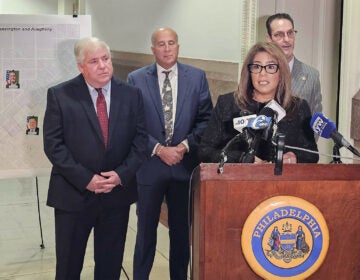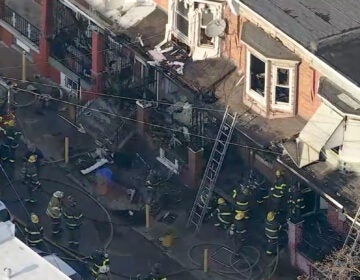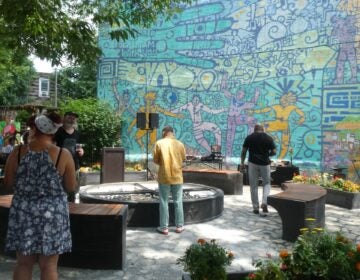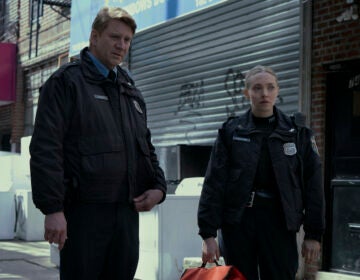Major law enforcement sting stirs fear among residents over intensified policing in Kensington
A recent large-scale drug raid involving camouflaged militarized police has some residents worried that it's a sign of things to come in the neighborhood.
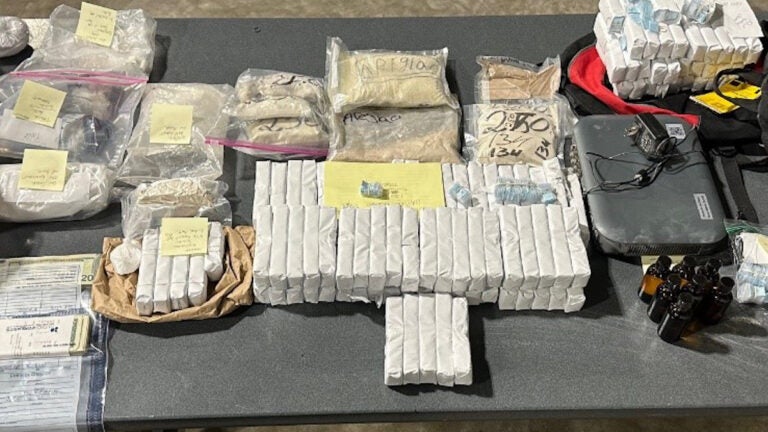
The Pa. Attorney General's office's action resulted in several arrests and seizures of five kilograms of fentanyl, along with other drugs, firearms, and cash. (Pennsylvania Attorney General Office)
From Philly and the Pa. suburbs to South Jersey and Delaware, what would you like WHYY News to cover? Let us know.
With an open-air drug market and long-standing problems fueled by the opioid crisis, Philadelphia’s Kensington neighborhood is no stranger to the around-the-clock presence of law enforcement.
But residents were surprised to wake up to an unusually large police presence last Thursday.
Yari Martinz, an owner of a corner store near Kensington and Allegheny Avenues, witnessed the scene after picking up her baby daughter.
“All these police came in [the store] – the SWAT team and everybody – and they were just like, ‘you got to get out of here,’” she said. “And they didn’t want to get me back in the store. And I was like, ‘I need to go back to the store because I have my daughter.’”
As she stood outside, law enforcement officials directed her to leave the area or lock herself inside.
That’s when Martinz noticed two men being escorted out of an adjacent building by heavily armed federal agents dressed in camouflage gear. The two men were placed into an armed tactical vehicle.
“I seen them take them to the trucks and everything. And they were just getting people out of the way for like almost an hour doing all this. It was crazy,” she said. “We were all confused because people were like, ‘Oh, they’re gonna throw something, and it’s gonna be loud and this and that.’”
Although this level of law enforcement activity is rare in Kensington, it’s tied to intensified policing throughout the neighborhood. A heightened presence that has seemingly led to quicker 911 call response times, Martinz said, but also shrinking homeless encampments and open drug use.
“Every single day they [police] have people cleaning up the streets, and it’s like you don’t really see them now like you used to see them before,” she said.
There’s been a noticeable increase in police
On Saturday, the members of City Council’s Kensington Caucus – Councilmember Quetcy Lozada (7th District), Councilmember Mike Driscoll (6th District), Councilmember Jim Harrity (At-Large), and Councilmember Mark Squilla (1st District) – confirmed that Thursday’s activities were part of a special operation by the Attorney General’s Bureau of Narcotics Enforcement.
Other reports indicate that six individuals were arrested on charges of drugs and firearm possession.
In a statement, caucus members said they support “the work of all of our public safety partners and their efforts to restore the quality of life for the residents who call Kensington home.”
Members of the caucus also clarified that the operation was not organized by Mayor Cherelle Parker’s administration, or the Philadelphia Police Department.
Regardless, business owners and people working for nonprofits alike have noticed a change in the neighborhood. These changes make the residents more acutely aware of law enforcement than before.
“There’s definitely been more police,” said Margaux Murphy, executive director of Sunday Love Project. Murphy’s nonprofit also operates Greater Goods, a free grocery store on Kensington Ave. that serves the community.
“I have people on the street telling me that they’re afraid to have drugs because they’re everywhere,” she said. “I think people are more scared if they have warrants … it has been a little overwhelming lately with how many police are here. I’m just not sure exactly what they’re doing.”
Fear of a new normal
City Hall has given no indication that actions similar to last week’s will be taken again in the future. But it’s not quelling concerns among residents and harm reduction advocates, many of whom believe this level of policing could become the norm.
In fact, some believe these events are tied to a bigger vision that involves creating a “triage center” – a type of diversion center where police offer an ultimatum of treatment or jail.
Photos of Thursday’s raid were taken by residents and circulated throughout social media last Friday.
Community Action Relief Project (“CARP”), a mutual-aid coalition in Kensington reposted these images on their Instagram page, with a call script urging City Council and Mayor Cherelle Parker to reconsider the use of police as “forced treatment” for substance abuse disorder.
The Philadelphia Coalition for Dignity in Treatment also posted a statement, claiming that Philadelphia Police have been engaging in neighborhood sweeps for a while now, conducting “jump outs” – a paramilitary tactic where plainclothes officers carry out arrests of individuals using drugs.
The group then called on the Parker Administration to end the “inhumane” escalation of police violence, which they say threatens incarceration or entering drug treatment.
Kelsey León, a member of the Community Action Relief Project, said that Thursday’s event is emblematic of a systematic trend of policing over the past several months, as reported by long-time Kensington residents, and individuals looking for substance use treatment.
“We were also collecting feedback about what the continued police presence and interventions like this does to the community,” she said. “And there was absolutely a level of unsettlement, anxiety and fear amongst folks who are on the ground. And one thing that we heard was that folks are concerned that the police presence will inhibit or discourage outreach efforts.”
In recent months, the coalition has observed the results of “police sweeps” up and down Kensington Ave. At areas near the Market-Frankford line at Huntingdon Ave station — a well-trafficked stop with nearby homeless encamps — the area is almost completely cleared out, León said
“The section that I am thinking of in particular is the overpass and the tunnel that’s right next to our hub…there used to be like 20 to 30 people there at any given time, and I’m a little bit more aware of that because me and some of the other folks who volunteer would take medical wound care bags and go out and hand out medical supplies, or navigation for folks who are trying to get into treatment,” she said. “And now there’s just no one there. It’s very unsettling.”
She said that a heavier police presence has forced some to begin hoarding supplies, such as Narcan and clean syringes because there’s concern that they won’t be accessible much longer.
Community Action Relief Project originated in 2020, and became a part of the Philadelphia Coalition for Dignity in Treatment that formed in 2023, following the closure of Penn Medicine’s Inpatient Rehabilitation Unit at Penn Presbyterian Hospital last June. Leon sees the closure as just one aspect of dwindling resources for people with substance use issues – at a time when demand for these services is high.
“Fortunately, there is a wealth of experts throughout the city and the subject area,” she said. “But no amount of expertise in the world will make up for a lack of compassion for people who are using drugs or who are unhoused, and who are seen as blights on the neighborhood.”
Support for WHYY’s coverage of health equity issues comes from the Commonwealth Fund.
WHYY is your source for fact-based, in-depth journalism and information. As a nonprofit organization, we rely on financial support from readers like you. Please give today.


